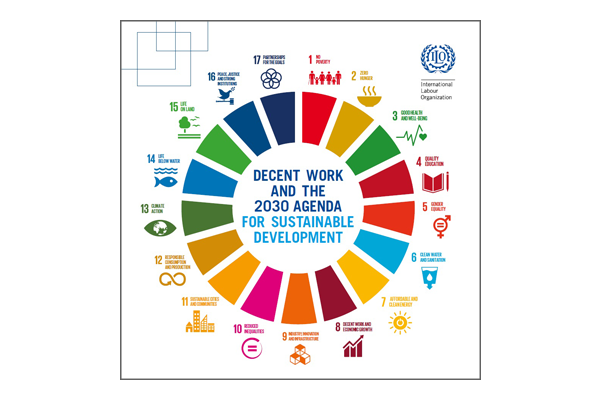Travail décent et le Programme de développement durable pour 2030 (OIT, 2016)

Traduire:
Decent Work is not just a Goal – It is a Driver of Sustainable Development
More people in decent jobs means stronger and more inclusive economic growth. Improved growth means more resources to create decent jobs. It is a simple equation but one that has been largely neglected in international policy-making both before and after the 2008 fi nancial crisis. With the 2030 Agenda for Sustainable Development we have a once-in-a-generation chance to make a change and improve the lives of billions.
Decent work puts money in the pockets of individuals and families that they can spend in the local economy. Their purchasing power fuels the growth and development of sustainable enterprises, especially smaller businesses, which in turn are able to hire more workers and improve their pay and conditions. It increases tax revenues for governments, who can then fund social measures to protect those who cannot fi nd a job or are unable to work.
Promoting jobs and enterprise, guaranteeing rights at work, extending social protection and promoting social dialogue are the four pillars of the ILO Decent Work Agenda, with gender as a cross-cutting theme. These are crucial to advancing the entire sustainable development agenda. Decent work for all reduces inequality and increases resilience. Policies developed through social dialogue help people and communities cope with the impact of climate change, while facilitating the transition towards a more sustainable economy. And not least, the dignity, hope and sense of social justice derived from having a decent job helps build and maintain social peace.
It is no wonder that people put a decent job among their top priorities in the global consultations for the 2030 Agenda.
As UN Secretary-General Ban Ki-moon has said, the 2030 goals “address the requirements for all humanity to be able to live decent lives free from poverty, hunger and inequality, with all men and women, girls and boys able to develop their full potential. They commit all of us to be responsible global citizens, caring for the less fortunate, as well as for our planet’s ecosystems and climate action on which all life depends”. We cannot understate the challenges that lie ahead for the world of work. Global unemployment remains unacceptably high at around 200 million people, while hundreds of millions more are in working poverty. In addition, the next 15 years will see major transformations in the way we work, driven by technological, environmental and demographic changes.
But we can realize the vision of sustainable development of this transformative agenda by 2030 if we all come together in a global partnership of governments, business and trade unions, as well as multilateral organizations, civil society and ordinary people. Each and every one of us has a role to play, to ensure no one is left behind.
Guy Ryder
ILO Director-General

